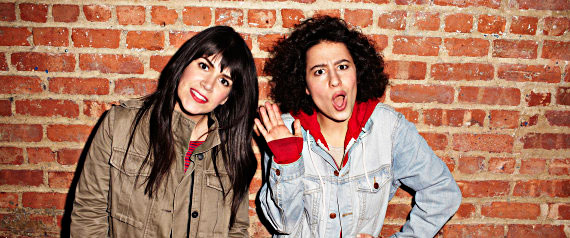
In a recent episode of “Louie,” Louis C.K. tells a struggling and terrible young comedian not to go into comedy. “You have to start with what makes you laugh,” C.K. tells him as a piece of hopeless advice.
What makes people laugh means something different to everyone. Comedy is the most subjective of genres; millions might laugh at Adam Sandler getting hit in the testes, while some prefer to smirk at S.J. Perelman’s New Yorker stories.
Today’s television landscape largely dismisses the difference between brows high and low, though. Take “Louie,” which, at the beginning of an episode, wrings comedy out of the main character having to poop really badly and struggling to make it to his apartment before he can’t help himself. Later, he makes a conversation about how the nature of comedy itself is funny.
Brow level is one of “Louie’s” many concerns. But one of the show’s most unique traits is its occasional concern with plot. As a general rule, comedies are only concerned with plot insofar as it is within a single episode. The characters in an episode go from point A to point B, but it doesn’t necessarily impact the story of the show as a whole. There are occasional stories that stretch episodes — Fry and Leela’s romance in “Futurama,” the reverend’s conviction in “The Unbreakable Kimmy Schmidt” — but overall, comedy is concerned with, well, the jokes.
“Louie” is largely like that, even though there are recurring themes such as parenthood and divorce. But every once in a while, C.K. has multi-episode narrative arcs, most prominently the six-episode “Elevator” arc in the last season. In that part, C.K. almost abandoned comedy altogether, accentuating his desire to push the show beyond just the genre. What makes “Louie” special is that it sprinkles in those series-long stories into a show that otherwise doesn’t even pretend to think about plot.
While the dominant mode of television comedy is plotlessness, “Silicon Valley” ignores the trend by being almost as much a drama as it is a comedy. It started out as a parody of Silicon Valley culture, but then, while burrowing itself into the culture’s intricacies, fashioned a plot almost accidentally out of those elements. Just when the show seemed to be repeating the same bits about out-of-touch billionaire venture capitalists, it got a heart. It’s now watchable almost as much for the story: Pied Piper’s journey toward becoming a successful business, and therefore startup founders’ journey toward owning one.
In its second season, “Silicon Valley” is making more of an effort to mock and break free of the “bro” culture that dominates the actual Silicon Valley. In the first season, it mostly co-opted that environment with elaborate dick jokes. Now, it’s trying to integrate Monica, one of the people who works for the venture capital company funding Pied Piper, more into the show. By doing that, though, it pulls away from the bro-y-ness of the comedy and turns more toward the sexism. So far in the season, the show has an apprehensive attitude toward having women be a part of lowbrow bodily function jokes.
The overall comedic trend, though, is to embrace it. Since the success of “Bridesmaids” married lowbrow comedy and feminism four years ago, the floodgates have opened in the entertainment industry. “Broad City” is one of the more popular culprits. It doesn’t quite descend to poop jokes, but it does — in a similar way to “Louie” — mix high and lowbrow. It’s a show borne on weed culture, letting itself get into distracted, somewhat surreal episodes. But at other episodes, it’s sincerely about the absurdity of growing up and trying to make it in this challenging world, the essence of almost every other comedy on television today.


